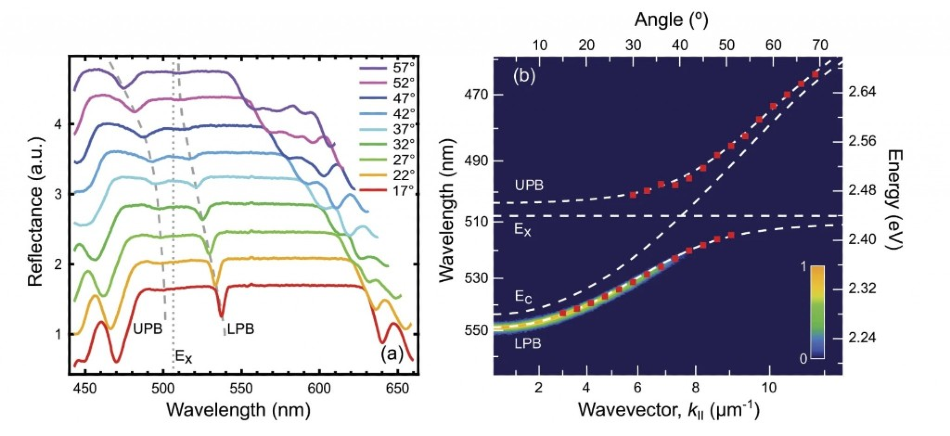Feb 24 2020
A research team at the Hybrid Photonics Laboratory of the Skolkovo Institute of Science and Technology (Skoltech) and the University of Sheffield (United Kingdom) achieved a great step forward in gaining insights into nonlinear physics of the strong interaction of organic molecules with light.
 Strong light-matter interaction in the dye-filled microcavity. From: Mechanisms of blueshifts in organic polariton condensates. Image Credit: Skoltech.
Strong light-matter interaction in the dye-filled microcavity. From: Mechanisms of blueshifts in organic polariton condensates. Image Credit: Skoltech.
Principles of the strong interaction between light and matter pave a new way for low-energy and ultra-fast all-optical data processing. The study outcomes were reported in Communications Physics and published in the February issue of Nature Physics. The research was supported in part by the Russian Science Foundation (RSF).
Almost all are aware that organic matter is the basic building block for living nature. As a matter of fact, the interactions between light and organic molecules is a crucial process for photosynthesis, light-activated biochemical regulation, and several other mechanisms in nature that make life on Earth possible.
Apart from this, there exist dozens of applications for a wide range of light-matter interactions in organic systems. Currently, organic materials form a broad category of materials that are actively used in light-emitting devices (LED) industry, in solar cells and flexible electronics fabrication, as biolabels of cancer and photosensitive sensors, etc.
The fast-growing market for organic LED (OLED) is a good example illustrating the immense commercial potential of organic materials in real-life technologies.
Led by Professor Pavlos Lagoudakis, the focus of Skoltech’s Hybrid Photonics Laboratory is to develop a new class of optoelectronics founded on strong interaction between light and organic materials. The main difference from traditional approaches is that in such systems, light (photons) is strongly correlated with aggregated electronic excitations on a molecule (excitons), producing new particles known as polaritons.
These light-matter entangled particles feature electronic properties of materials and ultra-fast light propagation, leading to a highly exotic hybrid form of light and matter known as liquid light.
Does this make a world of difference? Sure it does, because the strong light-matter coupling can slow down the photodegradation of molecules, extending their lifetime, change the course of photochemical reactions, and provide photons with an ability to interact with each other; the latter feature allows us to develop efficient optical signal processing devices.
Pavlos Lagoudakis, Professor, Hybrid Photonics Laboratory, Skoltech
At present, fiber optic networks manage enormous amounts of data. However, for processing optical signals, it is essential for light to be converted into electrical signals and back. By contrast, strong-coupling principles provide exclusive opportunities for all-optical data processing technologies, with better energy conversion efficiencies and record speeds.
In the last 10 years, exceptional progress has been made in the field of polaritonics, with the wide spectrum ranging from the first organic polariton laser to the invention of the first organic polariton transistor and room-temperature superfluidity. A noteworthy point is that Skoltech is a global pioneer in this field.
But in spite of the splendid achievements, the mechanisms of polariton interactions in organic systems are still not completely understood yet, calling for debates in the scientific community. Finally, the conundrum of polariton interactions has been resolved: the study at Skoltech offers an absolute solution to this disputable question.
The researchers performed detailed experimental research that showed an evident origin of nonlinear phenomena associated with polariton condensates—the state that includes hundreds and even thousands of polaritons that share similar properties.
Our experiments indicate an abrupt shift in spectral properties of polariton condensates when established, which always drives the frequency of polaritons toward higher values. We find this specific to nonlinear processes occurring in the system. For example, as we can measure the temperature of metal through its change in color as it is heated, similarly, we extract nonlinearity of organics by means of in-depth analysis of the frequency shifts.
Dr Timur Yagafarov, Study First Author and Junior Research Scientist, Hybrid Photonics Labs, Skoltech
The extensive experimental study, together with an in-depth data analysis, enabled determining the significant dependencies of the polariton nonlinear properties on the major parameters of the interaction between light and organic molecules.
The Skoltech researchers were the first to identify the powerful impact of the energy transfer between adjacent molecules on the nonlinear properties of organic polaritons, and currently, they have gained insights into the basic mechanisms that drive polaritons in organics. Using the theory put forward, it is feasible to find the experimental parameters needed to couple multiple polariton condensates into one circuit and create a polariton all-optical signal processor.
From a basic perspective, the new understanding may help describe the phenomenon of polariton superfluidity in organic matter.
These findings are of high interest not only to our research area but can be helpful in other fields as well. I believe the nonlinearity mechanisms discovered are quite general among the organic materials, therefore it might prove to be universal for strongly-coupled organic systems.
Dr Anton Zasedatelev, Senior Research Scientist, Hybrid Photonics Laboratory
Source: https://www.skoltech.ru/en/